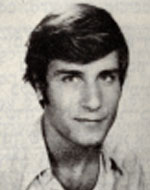Ben Yishai (Benisho), Moshe
Moshe, son of Esther and Masoud, was born in 1951 in Arpud, Morocco, and immigrated to Israel with his family in 1963. In his hometown he studied in the general school and Talmud Torah, and when he immigrated to Israel he studied at the Kol Ya’akov elementary school in Yeruham, He was a talented student and excelled in all his subjects, and his teachers praised him for his diligence and intelligence, although he devoted himself to real studies, but secretly engaged in poetry, read songs and wrote poems. He was very sociable, friendly, loving and welcoming A man who had never refused them when they turned to him to help them, and who was always attentive to their words in times of distress: he was kind, generous and broad-spoken, pleasant, He was curious and had a desire to reach out to each subject and successfully complete every task he took upon himself, and everyone recognized him as a responsible person, punctual in his actions and meticulous in every tag. Moshe was drafted into the Israel Defense Forces in August 1969 and assigned to the Armored Corps, where he completed a course for the tank commanders of Patton, and completed a course for commanders of the Patton tank, serving as an example of his friends in his good temper, obedience and tolerance. And his commanders gave him the “Operational Service Medal.” After the liberation he studied at the Negev University in Be’er Sheva with a view to electricity, and during the 1973 Yom Kippur War Moshe took part in the braking battles against the Egyptians on the Sinai front, on October 14, A television station in the central sector of Sinai, Moshe fell in battle, a missile hit his tank and he was killed on the spot. Water cemetery in Yeruham. Is survived by his father, mother, three brothers and three sisters. In a letter of condolence to the bereaved family wrote to his commander: “Fitness and persistence actions served us, his friends, the source of power. He was loved and accepted by his friends and commanders. “
